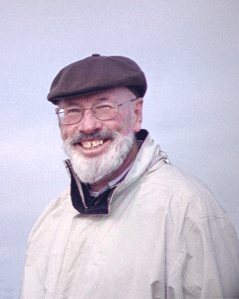Maxwell John Cresswell
(1939 – 2024)
MA(Hons) NZ, PhD Manchester, LitD Wgtn, FRSNZ

Max Cresswell was a highly creative and prolific scholar, one of the most important figures in philosophy in New Zealand. His principal work was in the areas of modal logic and formal semantics of natural languages. He died peacefully on 22 September 2024, at the age of 84, after a short illness.
He was born in Wellington on 19 November 1939, and grew up in the suburb of Karori with his family, as the eldest of three boys. The youngest, Lyell, became an acclaimed composer of classical music. The middle brother Roger became a lecturer in education in Australia.
For secondary schooling Max attended Wellington College. He left after the Sixth Form, skipping the final year of school to enrol in 1957 at Victoria University College, then a branch of the University of New Zealand. He began a law degree, which required a selection of Arts courses in the first year. His choice included philosophy, and that changed the direction of his life: he “fell in love with Aristotelian logic”.
Logic is the study of principles of reasoning and the conditions under which statements are true or false. It is an interdisciplinary field with connections and applications to philosophy, mathematics, linguistics and computer science. Taking more philosophy in his second year enabled Max to study more logic, taught by Professor George Hughes and David Londey. By the end of that year Max had abandoned the law degree. He proceeded to complete a Master of Arts with Honours in philosophy in 1960, with a thesis entitled Investigations in Modal Logic, concerning a branch of logic that explores different “modes” of truth, expressing ways in which a statement may be true (necessarily, possibly, eventually, believably, provably etc).
The thesis was externally examined by Arthur Prior, a New Zealand philosopher-logician who had recently moved from Canterbury University College to a chair at the University of Manchester. Prior was impressed by the thesis, and this no doubt helped Max to secure a Commonwealth Scholarship, enabling him to travel to England to study with Prior. After completing his PhD studies he returned in 1963 to the newly-established Victoria University of Wellington, to take up a lectureship in philosophy, filling a vacancy that had arisen from the return of David Londey to Australia.
Formal logic uses symbolic languages and mathematical methods to analyse logical systems. Semantics is the study of the meaning of linguistic expressions. In the 1960’s there was a revolution in the formal semantics of modal logic, caused by the introduction of the notion of truth in a possible world or situation. Max began a book collaboration with George Hughes and the result, An Introduction to Modal Logic (1968), was the first textbook explaining this new possible-worlds semantics. It was used in universities all around the world and translated into Italian, Spanish, German, and Japanese. Max and George later wrote a sequel, A Companion to Modal Logic (1985), and then a complete rewriting and updating of the first book as A New Introduction to Modal Logic (1996). These books contained a great deal of original research on systems of modal logic, as well as expository material. According to Google Scholar they have been cited nearly 5000 times.
From around 1970 Max was involved in the application of formal logic to the study of natural languages, like English. This brought the semantic revolution in philosophy to bear on linguistics, through the insight that knowing the meaning of a sentence is knowing its truth conditions, which can be accounted for in terms of the set of possible worlds in which it is true. A key contribution was Max’s system of lambda-categorial grammar, providing the ‘deep structure’ or ‘logical form’ of the surface grammar of a sentence of natural language, in a way that allows its formal semantic interpretation to be read off. In seven published books and numerous articles he developed and applied his semantical theories, covering such topics as belief reports, quantification, anaphora, negation and the treatment of tenses.
As well as logic and formal semantics, Max undertook research on the history of philosophy, publishing many articles on Plato and Aristotle, and on the philosophies of John Locke and F. H. Bradley. Altogether his research output included thirteen books and more than 250 journal articles, reviews, invited talks and conference papers.
Max’s research achievements were recognised by Victoria in 1973 by the award of a Personal Chair. This was an extremely rare occurrence: at that time professorial status was not part of the promotion system and could not be applied for. Over the years he held many visiting fellowships and professorships at universities in Europe and North America. He retired from Victoria in 2000 and became Emeritus Professor. He then took up a series of temporary positions at the University of California at Davis, Massey University, Texas A& M University, and University of Auckland, before returning in 2009 to Victoria, where his research was supported by Marsden Fund grants and he continued to teach until 2021.
Those of us who knew Max as a teacher, colleague or friend, and sometimes all three, knew him as a kind and unassuming man who was welcoming, encouraging, enthusiastic and supportive. A man who liked to laugh and found much to laugh about, and for whom the pursuit of intellectual understanding was a lot of fun.
Max outlived his brothers. He is survived by his wife, the philosopher Adriane Rini, his son Jeremy, and his stepdaughter, the linguist Miriam Meyerhoff FRSNZ.
Rob Goldblatt and Edwin Mares
Bibliography
A full list of Max’s publications is available in his Curriculum Vitae at www.cllc.vuw.ac.nz/max/maxcv.pdf
